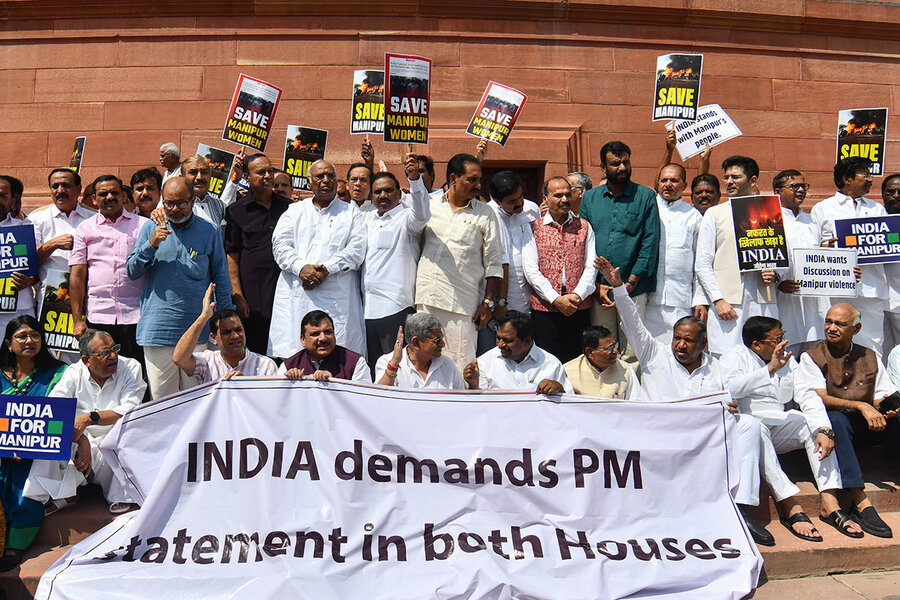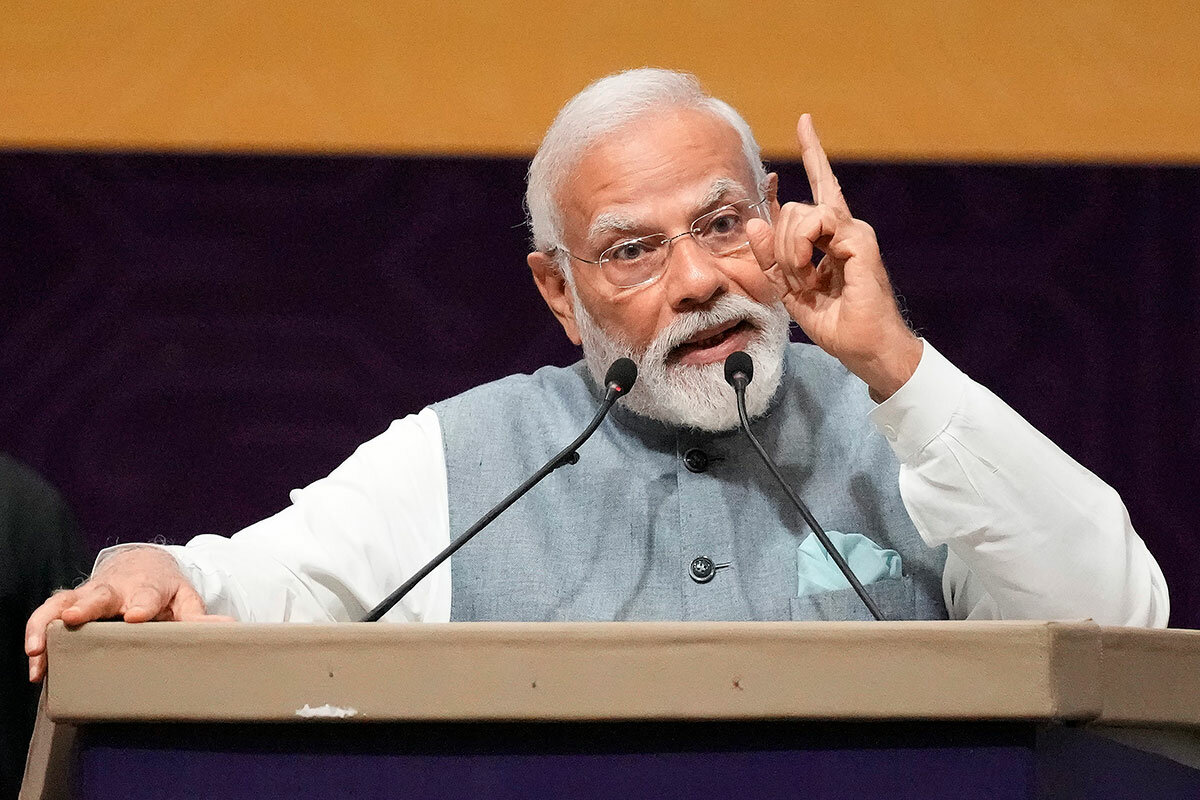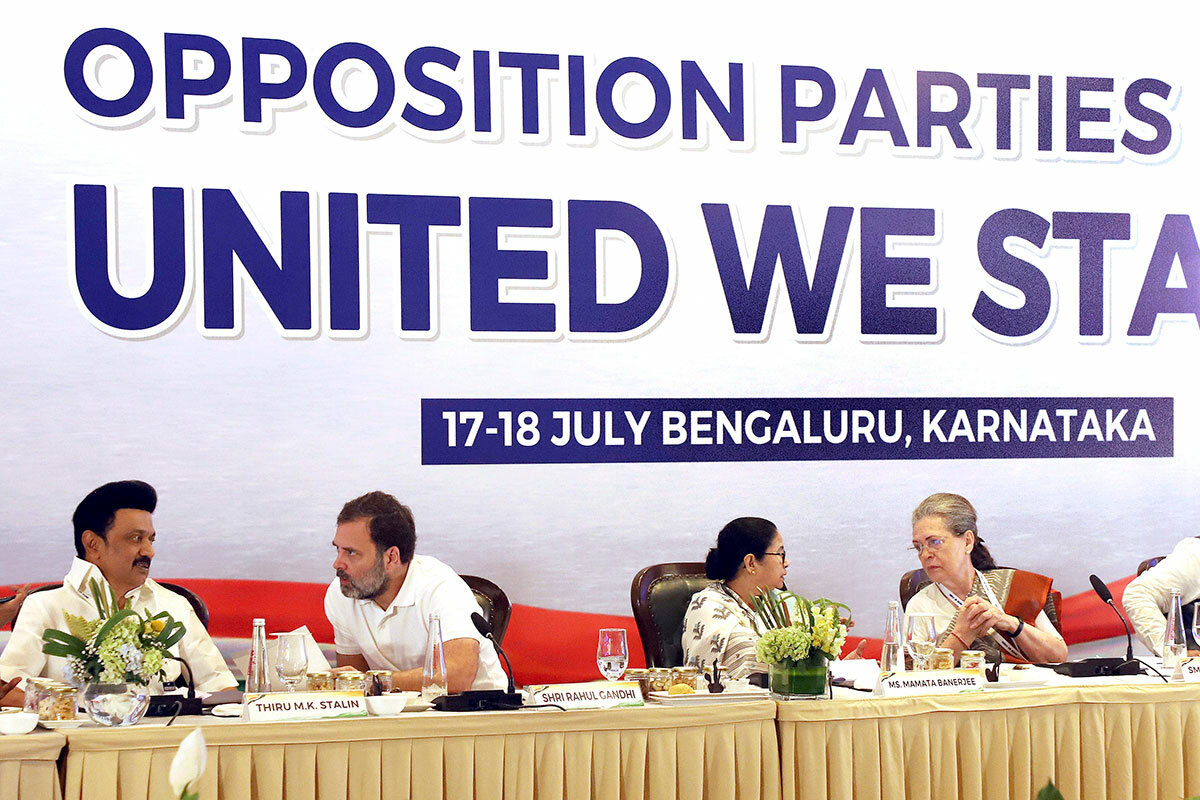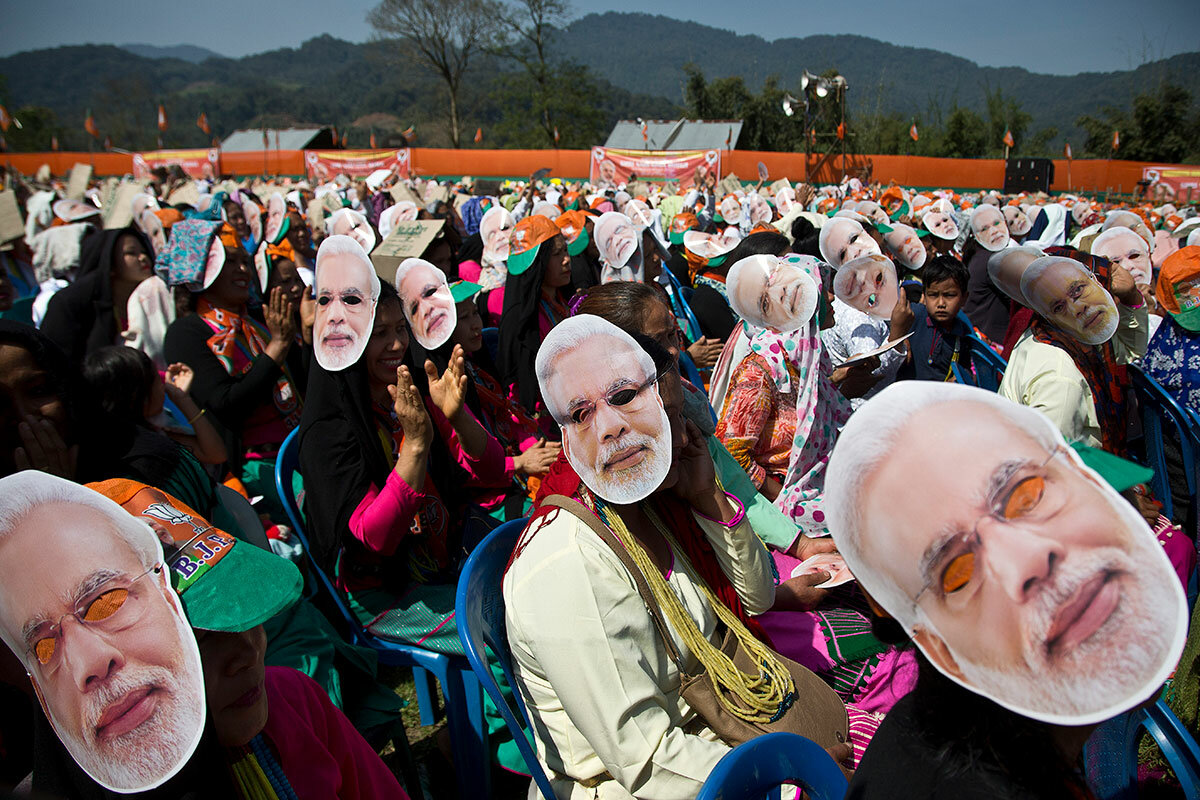India’s opposition parties team up to beat Modi. Is it enough?
Loading...
During India’s tryst with authoritarianism in the 1970s, hope for a democratic revival came from an unlikely place – a prison in the southern city of Bengaluru.
India had taken a dictatorial turn after then-Prime Minister Indira Gandhi imposed a state of national emergency. The press was censored, the judiciary compromised, and opposition leaders were thrown in jail. During their stay in the Bengaluru prison, prominent figures from India’s various opposition parties set aside their differences to lay the groundwork for the Janata Alliance, a rainbow coalition of disparate parties ranging from communists to far-right nationalists, which eventually defeated Mrs. Gandhi’s Congress party.
More than four decades later, amid growing concern over India’s democratic backslide, Bengaluru is witnessing a similar bid for cooperation.
Why We Wrote This
A story focused onA common enemy can be a powerful unifier. But in India, a new rainbow coalition will need to dig deeper if it wants to sweep the polls and stop the country’s democratic backslide.
Last month, 26 opposition parties gathered in the Karnataka capital to declare a new coalition: the Indian National Developmental Inclusive Alliance (INDIA). The goal is to unite India’s fractured opposition ahead of the 2024 parliamentary election, and to unseat Prime Minister Narendra Modi and his right-wing Bharatiya Janata Party (BJP), which has been criticized for targeting minorities, curbing free speech, and abusing India’s democratic institutions. Critics say the alliance faces an uphill battle – the main challenge being crafting a platform that will mobilize voters from different backgrounds – but history suggests INDIA shouldn’t be written off.
The formation of INDIA brings hope for India’s democracy “simply because it offers an alternative to the ruling party,” says Christophe Jaffrelot, a scholar of South Asia politics who has authored books on the Indira Gandhi and Modi regimes. “... INDIA, like the Janata, does not have a clear prime minister in waiting. ... [But] people may still vote for its candidates to get rid of the ruling party and its anti-democratic and anti-social policies.”
Saving India’s democracy
Not long ago, India was considered a poster child of democracy, but today it has come to exemplify a global trend of democratic recession.
Several independent organizations have sounded alarms over the decline of Indian democracy. While the V-Dem (Varieties of Democracy) Institute in Sweden demoted India’s status from a “democracy” to an “electoral autocracy,” the country went from “free” to “partly free” in Freedom House’s study of political rights and civil liberties. Rajeev Gowda, senior spokesperson of the Congress party, the largest opposition party and the leader of INDIA, says that India has seen relentless attacks on “the country’s democratic and federal edifice.”
“Given that BJP rule has worsened religious polarisation and increased divisiveness, violence, and economic inequality, it is imperative that parties committed to the values enshrined in the Constitution of India come together to defeat the BJP,” he says via WhatsApp. “That is the logic for the birth of the INDIA coalition.”
And when it comes to winning seats in parliament, cooperation is essential.
India’s “first past the post” voting system works on a winner-take-all basis. People vote for a single candidate, and the candidate with the most votes wins. This, combined with the fact that India has always had a dominant national party and a splintered opposition, means that the incumbent historically has the advantage. The BJP, which replaced the center-left Congress as India’s dominant party in 2014, can win a higher share of seats with a relatively lower vote share. In the 2019 polls, they won 55% of the parliamentary seats with 37% of the popular vote.
By joining forces, INDIA members aim to mitigate that imbalance, though it took years to form an alliance. Dr. Jaffrelot blames the delay on the BJP’s “carrot and stick” approach of keeping smaller, regional parties in check. While Mrs. Gandhi chose to imprison the entire opposition back in the 1970s, many say that Mr. Modi has used central law enforcement agencies to intimidate his opposition.
Parties fell in line out of fear or favor, says Dr. Jaffrelot, and for the same reasons, a few key parties have still opted out of INDIA.
INDIA’s pitch
Sanyam Kumar, a banking professional who voted for the BJP in the previous elections but now finds himself on the fence, agrees that the Modi administration has undermined India’s democracy. But he says he’ll still vote for the BJP if INDIA can’t produce a concrete, compelling platform.
“I do not think they can get me to vote for them if their only [unique selling point] is ‘saving democracy.’ I am not buying that,” he says, opining that no matter who is in power, the government always encroaches on liberties. “They need to talk about the real issues to get my vote.”
Yashraj Wade, a Mumbai-based consultant who leans toward the BJP, is also skeptical. He sees INDIA as a hodgepodge of parties threatened by the mass appeal of Mr. Modi.
“Their single-point agenda is to be anti-Modi,” he says, adding that sticking to this narrow focus “would only weaken them further and strengthen the BJP.”
Indian political scientist Suhas Palshikar agrees that most governments succumb to democratic transgressions – “All jailers seek to keep the prison intact,” he says, referring to draconian laws implemented under previous ruling parties – but is quick to point out that the BJP has been threatening the very foundations of India’s democracy. Mr. Palshikar also contests the idea that INDIA is little more than a Modi hate club.
“The anti-Modi tag has been employed by the BJP and Modi himself and the pliable media has dutifully picked it up,” he says. “The initial brief statement by INDIA does go beyond Modi,” touching on the Manipur conflict, economic crisis, unemployment, and inflation.
Still, to succeed, INDIA will need to project itself as more than an “anti-Modi” alliance, as well as confront the limitations to its “saving democracy” pitch. Indeed, in a country with rampant poverty, inequality, and hunger, the average voter’s choices are driven more by bread-and-butter issues than abstract issues of democracy. Mr. Gowda, from the Congress party, says that INDIA constituents are working toward a common agenda aimed at providing relief to the poor and widening the social security net.
Driving this cooperation is the same force that brought the member parties to Bengaluru in the first place.
“They have realised – at last – that their very existence was at stake,” says Dr. Jaffrelot, in an email. “If opposition parties do not close ranks, their fate is sealed.”








